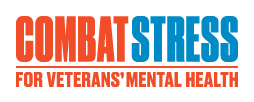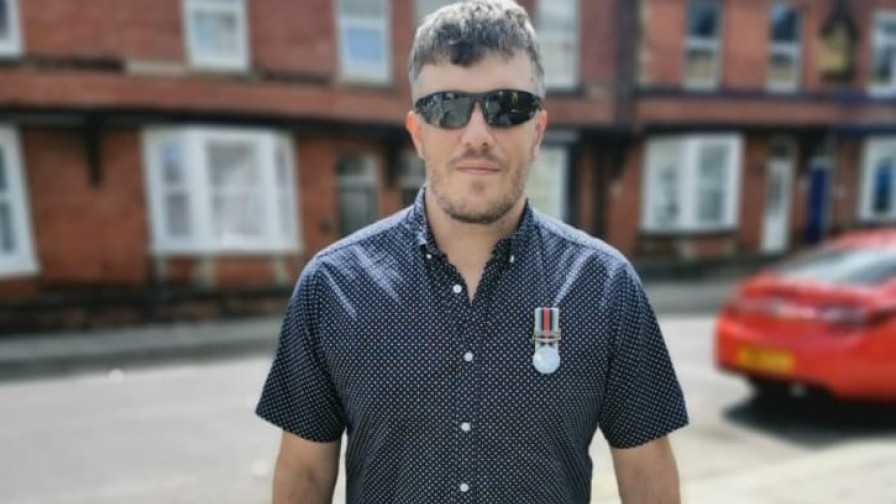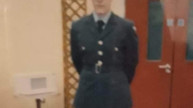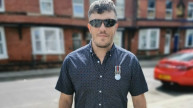Lewis' Story
“I took my little girl to a firework display - it was only possible because of Combat Stress.”
A six-month tour in Afghanistan left RAF veteran Lewis with Complex PTSD, but thanks to Combat Stress’ expert treatment he’s now living his life to the full again.
“I was 16 when I joined the RAF in 2001 and at that age, you’re still a child,” says Lewis. “You go in with these dreams and your imagination goes wild.”
During his 10 years in the military Lewis was based at RAF Benson and loved the sports that were on offer as part of military life, as well as the camaraderie. “I enjoyed it,” he says. “The sense of brotherhood was the best part of my military career. I didn’t even really see it as work. It was my first job, so you think every job is going to be like that - eating, sleeping, and playing at work.”
In 2006 Lewis was deployed to Afghanistan as part of Operation Herrick and marked his 21st birthday there. “Being young I was naïve before I went,” he says. “I thought I’d go out there and be home for tea and biscuits with a shiny medal, everything would be amazing, and my friends would think I was some sort of hero.”
Lewis experienced the reality of life in Afghanistan before he’d even landed. “I flew with other guys from RAF Brize Norton to Kabul in a TriStar, which was just like going on holiday apart from the uniform. We changed at Kabul into a Hercules to fly to Kandahar and were about to land when all the lights in the plane turned off. I noticed the older guys started taking off their helmets and sitting on them, so I asked why.
“One guy said the reason they turned the lights off was because there would be people on the ground taking pot shots at the aircraft. Sitting on your helmet stopped the bullets from entering your body. It brought me back to earth and I started to realise what I was going into.”
Lewis was meant to spend four months in Kandahar, but the person due to replace him at the end of the tour broke their leg so he ended up staying for six months straight. “Constant mortar attacks were a big part of the tour,” he says. “Your life and future aren’t in your hands – it’s out of your control and that’s a surreal way to live. You have a constant fight or flight feeling.”
During his time in Afghanistan Lewis was asked to clean out a Chinook that had been used by the Medical Emergency Response Team, to make it ready for the next call.
“The medics had tried to save two people in the helicopter, and I was given a hazards bag and told to clean it up,” he says. “I wasn’t prepared for what I saw.”
This experience was something which stayed with Lewis beyond his tour. “I came back to England and was on autopilot,” he says. “The first time I realised something was a bit off was when I went back home for a few weeks on leave and my family and friends held a welcome home party. But I found myself sitting in the corner watching my friends having a great time thinking ‘why have they changed?’ It took a while to realise it was me that had changed.”
Lewis started feeling angry and having mood swings. “My relationship broke down, I was pushing people away and avoiding social situations,” he says. “I had physical symptoms too; sickness and headaches, night terrors and insomnia. It was horrendous.”
His family intervened and told Lewis he needed to get help. “I respect my Mum so when I went back to base, I spoke to a doctor and started Eye Movement Desensitisation Reprocessing (EMDR),” he says. “It worked well for me, but when I left the Air Force in 2011 I had to stop the treatment.
“It felt a bit like I’d been abandoned, and I had no sense of belonging. I couldn’t build relationships because I was trying to deal with my PTSD, but I didn’t know that was what I was dealing with – just that I was different.”
Lewis moved around the country with different jobs trying to escape the isolation he felt, prompting his mum to give him the nickname “Nomad”. He was drinking and taking drugs to self-medicate, knowing that alcohol would numb him.
A doctor prescribed antidepressants, leading to Lewis taking an overdose. “It wasn’t planned,” he says. “I forgot one so took it, then just kept taking them. I told my dad what I’d done, and I ended up in hospital having my stomach emptied. It was a wake-up call that I needed to get this sorted.”
After trying NHS treatment first, Lewis called the Combat Stress Helpline “because I had nothing to lose” and after assessments was diagnosed with Complex PTSD. He had online treatment over six months, including EMDR and a Be Your Best Ally group with other veterans, to help develop self-compassion.
“The course was brilliant,” Lewis says. “There was so much banter, it was like being in the military again. I also had EMDR again and I never looked back. EMDR is more like magic than therapy. I developed so many skills while I was doing it, every time I started feeling angry or getting disassociated, I’d go to my safe space and be brought back down. It’s such a powerful tool. Now I recommend EMDR to every veteran I’ve met who’s experienced trauma.”
Lewis says a year ago he couldn’t imagine being in the good place he’s in now. “The best decision I’ve ever made was to contact Combat Stress and I think if I hadn’t, I wouldn’t be here today," he says.
“My treatment has been life changing. What might seem like little things for some are major steps for me, like being able to function in a normal society and go into crowds. I even took my little girl to a firework display last November; it all became possible because of EMDR and Combat Stress.
“I have hopes and aspirations for the future, which I never had before and life isn’t dark grey anymore, it’s colourful. I’ve got a good job now and can provide for my family; I’m optimistic for the future.
“After my daughter was born a couple of years ago, I completely changed my perspective. From that instant I knew that everything was for her. It was up to me to be the best person I could be, and to show her how life is meant to be. That was another reason for me reaching out for help, to get to where I needed to be and where I wanted to be. Hopefully now I can be the best person for her.”




